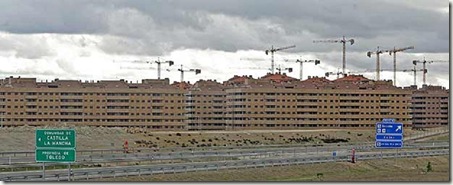ALEXANDER BEWICK HAS MOVED
March 29, 2009
Gambling on the box
March 23, 2009

There is a worrying trend spreading virus-like on Spanish television. Having no Sky or similar facility, I don’t know if the trend is spreading abroad, or even if it has come to this country from elsewhere.
As though there weren’t enough problem gambling in Spain, now we have every television channel and lots of radio stations offering quick riches at all times of the day and night – there are even whole programmes dedicated to it, mostly in the small hours but not all. Send a text message to such-and-such a number and you can win anything from €1000 to €500,000 – or x amount per month for the rest of your life, or for a year. Easy, isn’t it?
The catch words are ‘you can win’. No guarantee that you will. All you’re doing is taking part in a lottery. Each message will cost you well over €1, depending, I suppose, on the prize money.
That is as much gambling as poker, El Gordo or a slot machine. Unlike these, though, there is no legislation in Spain to control it. According to El País, the TV stations’ advertising income has plummeted and they are taking advantage of a legal vacuum.
The organization that is supposed to control gambling in Spain is the Loterías y Apuestas del Estado (LAE) but it classifies text message gaming as a competition and thus allows it without regulation.
There is a serious gambling addiction problem in Spain – not surprising when every bar has at least one slot machine and there are so many ‘official’ ways to do gamble: lottery, pools, specials, etc. And then there is online gambling, which, according to JARCA, a self-help problem gamblers organization very active in the Campo de Gibraltar, is creating more addicts than ever. Add these to the desperation of unemployment and you have a bomb. And we won’t even go into Bwin sponsoring Real Madrid on their shirts.
Gibraltar, too, is a major international online gambling centre, confirmed by a quick look through Google, where you will find all sorts of juicy get rich quick schemes. Most of them, though, have a link to some sort of self help organization such as Gamblers Anonymous, that they refer to in a miniscule section variously titled as ‘Social Responsibility’.
Compulsive gambling is an illness and recognized as such by the World Health Organization. It is the same as, say, alcoholism or drug addiction and has much the same results.
(c) Alexander Bewick 2009
Terrorists create terror, that’s their ‘job’
March 11, 2009
Terrorists are back in the headlines. We’ve just heard of two attacks by the ‘Real’ IRA in Northern Ireland. On the inner pages of a paper, we read about Pakistan, India, Sri Lanka, Iraq, Israel, etc. etc. We even read about ‘non-terrorist’ attacks in the US and in Germany, which by virtue of the madness of their perpetrators, create terror nevertheless.
But today, March 11, marks the fifth year since the largest terrorist attack ever in Europe (unless you count wars, which are another form of terror): the attack by Islamic terrorists on commuter trains in Madrid. One hundred and ninety-two people were killed, hundreds were injured and millions still remember it.
Today, March 11, should have been a day of remembrance, which for the more direct victims it surely is. But the politicians chose otherwise. At ceremonies held at various points along the route the trains took that fateful day, politicians laid flowers, made speeches and appeared in photos that will make the front pages. The trouble is that the PSOE chose not to appear at the official ones in protest against a decision by the PP (in government in Madrid) to conclude an investigation into spying on itself. What the hell has one thing to do with the other?
Today, March 11, at a time when unity in remembrance and as tribute to the victims should be the objective, politicians showed yet again that their only aim is self-interest. Even the various Victims of Terrorism groups in Spain, with their members going back into history but also including the more recent, are divided along political lines, choosing to attend separate ceremonies.
Shame on them.
(C) Alexander Bewick 2009
How rustic is your property?
March 2, 2009
The recent arrest of the Mayor of Alcaucín, Málaga, on corruption charges that include allowing building on terreno rústico, points the spotlight at a problem that is and has been recurrent certainly on the coasts if not all over Spain for a number of greedy years. Most of the buyers of holiday or retirement homes in these places are expats looking for a place in the sun. By expats I mean of any nationality, though in the most recent case in Alcaucín, they were mostly British.
The Spanish media is full of headlines on the subject. In Sunday’s edition of El País, an in depth analysis of this case had a separate item titled: Los residentes extranjeros, principales compradores (Foreign residents, the main buyers) in which the first paragraph reads: “They came to Spain for the sunshine and a garden they couldn’t afford in their home country. Their ignorance of the law and a lack of scruples on the part of builders, intermediaries and public officials did the rest.”
The article quotes a British buyer, “To us, rústico means rustic, of the countryside, not a synonym for land that can’t be built on.” And therein lies the crux.
The Junta de Andalucía and eight municipalities in the Almanzora area of Málaga, which contains Alcaucín, have counted over 3,000 homes built on terreno rústico an official designation that means You Can’t Build on It / Green Belt / No, No, No – or any other such approximation. But then, if your builder or developer knows his way around your local Town Hall, he may well have built on what is ‘about to become’ urbanizable land. How does he know that?
Many if not most of the smaller municipalities in Andalucía and other ‘sunny’ places, are operating under a Plan General de Ordenación Urbana (PGOU in it Spanish acronym, roughly translatable to General Urban Ordination Plan – or Town Planning Regulations) that dates back to 1987 or thereabouts. Things have changed since then, of course, particularly during the Aznar years in government -but not always- when developers appeared to be able to do whatever they liked with few consequences that couldn’t be settled with a little finesse. The result is plain to anyone who has ever seen those vast developments on what would otherwise be open countryside. The photo that illustrates this article is a prime example in Seseña, Toledo, where there isn’t even a coastline and the massive development has naturally run into all kinds of trouble in the present economic climate. We don’t know how many expats might have bought there, but that, too, was built on a PGOU that is ‘in the process of change’, a change that has been conveniently a-changing since the 1980s but that allows for hefty ‘commissions’ to be had from those same developers and builders, many of whom are now in jail, or should be.
One question arises about these purchases, one that has arisen all too often over the years: When was the last time you bought a property in Britain (or anywhere else in the northern part of the EU, for that matter) without a proper survey being done beforehand? It is true, though, that a survey in Spain can be extremely dicey: Is the surveyor being paid by the developer? Are the proper documents easily available from the Town Hall? Can you trust the surveyor, and if you do, can you understand what he says? And if you’re working through an estate agent, how much do you know about him or her?
(c) Alexander Bewick 2009
Rotten apples of all colours
February 27, 2009
I’m not sure why my friend Prospero at JimenaPulse posted an item about corruption in the Axarquía region of Málaga, given that his blog is about the Campo de Gibraltar. The only connection I can think of is that similar charges are rife all over the area in which I live, too. Indeed, my other blogging friend, Sancho at Tilting at Windmills, has written extensively on the subject as well.
In any case, it is a fact that corruption charges are at the height of fashion right now. On the national scene, there is an ongoing scandal that has the Partido Popular (PP) and the PSOE (Socialists) flinging accusations at each other all over the media. The PP is under investigation by former PSOE minister Judge Baltasar Garzón, about which I wrote at length in the previous item. On a more local scale, there are several cases in various courts involving not only these two parties, but also the Partido Andalucista (PA); Ronda, Gaucín, Jimena, La Línea, Los Barrios and Algeciras are merely those that come immediately to mind.
Perhaps the re-resurgence of these cases has to do with the present global financial crisis. Or with the habit of all political parties of pointing fingers at each other as a way to avoid dealing with what really concerns the voters: unemployment (Spain has the highest in the EU at 14.8%), immigration (boatfulls of sub-Saharan refugees, many dead, keep turning up in the Canary Islands), etc. etc.
The trouble is that corruption affects each and every one of us, unlike those issues above that tend to be more selective. Corruption is present, in larger or smaller measure, in all aspects of our lives, in all countries and throughout history. Like prostitution, it is one of those things we tend to ignore until it touches us personally, as it were. But corruption is also a form of prostitution: in one of its definitions, the Oxford English dictionary says that a prostitute is “a person who debases himself or herself for personal gain.”
Prostitution in Spain is illegal but ignored to a large extent (Prospero posted an item that said that the sex industry has lost 20,000 direct or indirect jobs thanks to the crisis). Not so corruption, lately anyway. But then, smokescreens are useful political tools and there are rotten apples in every barrel. Somehow, I would almost say that prostitution is ‘cleaner’.
(c) Alexander Bewick 2009
Shooting oneself in the foot
February 23, 2009
This is the scenario: Judge Baltasar Garzón initiates an investigation into systematic corruption in the Partido Popular (PP) of Madrid and other important cities. Arrests are made and heavy bails are set. Plenty of PP bigwigs are allegedly involved, some of whom are aforados, including a President of an Autonomous Region governed by the PP and several national and regional deputies (and more to come, apparently).The excrement hits the fan and the PP, which is under its own investigation for spying among its own ranks in Madrid, is in retreat.
When you’re cornered, you attack, don’t you? Mariano Rajoy, the Leader of the Opposition, says that Garzón, who was once, for a short time, a high-up elected PSOE parliamentarian and now sits as one of sx judges on the National Criminal Court , is persecuting his, Rajoy’s, party. Like manna from heaven, rather than excrement, for the PP, the Minister for Justice, Mariano Fernández Bermejo (PSOE, photo), is discovered to have gone on a weekend hunting jaunt with the famous Judge Garzón – not very cleverly at the northern Andalucía estate of a member of the PP. To make matters worse, the Minister of Justice did not have the right gun licence for Andalucía, so was hunting illegally.
This scenario turned out to be ideal for both parties: they are able to raise smokescreens of cross accusations instead of dealing with the economy, which neither party seems able to do. Indeed, the PP scored a victory today: Bermejo resigned his Ministry “but I will continue to work from my position as a Deputy”. He had presented his resignation last week but Zapatero didn’t accept it. Until he had to, obviously (See my article: The need to be right, below.)
Bermejo was on a roll until then. He was ‘renovating’ the judicial system, which badly needs it. (The budget for this phase of the renovation is €20 million, and the budget for handing out free long-life light bulbs throughout the country is €40 million.) But he was not well liked by those he was supposed to be renovating: there have been strikes by court officials, court Secretaries and even an unprecedented and allegedly unconstitutional strike by judges. His successor is Francisco Caamaño, who is known as a deft negotiator and well respected. It will take a lot of negotiating to unravel this mess.
In the meantime, the PP licks its chops – though not for long if Garzón has his way. But then, they’re all in an electoral battle in Galicia and the Basque Region, so they may be otherwise occupied.
But one thing must be said: Bermejo is one of very few Spanish politicians to have resigned for a misdeed. This brings to mind the non-resignation of several PP ministers of the Aznar era, who should have resigned for much more serious things, including the mishandling of the Prestige environmental catastrophe, the Yak-42 aircraft accident that killed 62 Spanish soldiers on their way back from Afghanistan – or indeed, Aznar himself, who got his country into the Iraq disaster in the first place, though he was elected out before he could do any more damage.
(c) Alexander Bewick 2009
The need to be right
February 16, 2009
 Charles Louis de Secondat, Baron de La Brède et de Montesquieu (1689-1755), better known simply as Montesquieu, wrote: “I believe that the thing above all which ruined Pompey was the shame he felt to think that in having elevated Caesar the way he did, he had lacked foresight. He accustomed himself to the idea as late as possible; he neglected his defence in order not to avow that he had put himself in danger; he maintained to the Senate that Caesar would never dare to make war; and because he had said it so often, he went on saying it always.” (My italics).
Charles Louis de Secondat, Baron de La Brède et de Montesquieu (1689-1755), better known simply as Montesquieu, wrote: “I believe that the thing above all which ruined Pompey was the shame he felt to think that in having elevated Caesar the way he did, he had lacked foresight. He accustomed himself to the idea as late as possible; he neglected his defence in order not to avow that he had put himself in danger; he maintained to the Senate that Caesar would never dare to make war; and because he had said it so often, he went on saying it always.” (My italics).
The French philosopher was talking about the Roman Empire, but the same could be applied to, say, Stalin regarding his continuing to purge his supposed enemies long after it was strictly necessary, if it ever was; or to Hitler, who was admittedly mad by then anyway, but carried on sending in ever greener troops into evidently lost battles; or to the Nazi extermination camp guards, who went on torturing and gassing their victims long after the end of World War II had been announced. It might also be applied, then, to just about anything that goes on in Iraq or Afghanistan, and certainly to Guantánamo. If you say it often enough, it becomes automatic and you dare not stop. Hence the need to be right.
What is it about human nature that makes us need to be right? Even in the pettiest of arguments we so often sound like children: “No, it isn’t!” “Yes, it is!” Does repetition become a ‘habit’ then? Does the need to be right become that, too?
We know that the perpetuation of a lie can easily turn it into a ‘reality’, at least in the minds of those who hear it and often in the minds of those who tell it. It is difficult, sometimes, to separate a truth from a lie in our own minds; it is even more difficult to do so in the public mind. Propagandists and advertising agencies know this all too well.
I’m veering off target somewhat but if the above is true, then our own need to be right, when subjected to sufficient repetition, automatically dismisses reason. A matter of not seeing the forest for the trees. Or a matter of false pride: I daren’t back down now, even if I am wrong.
Where does the need to be right lead us? Read the papers: corruption at all levels of society (as I write, the US has just ‘uncovered’ a massive fraud with payments for war material and humanitarian supplies in Iraq that is apparently larger even than the Madoff financial scandal – in itself a good example of the perpetuation of a lie); politicians who refuse to resign even when they’ve been found guilty in court (La Línea’s Mayor says he was not sentenced to resign, while the corruption scandals involving the PP in Madrid have elicited the oft-repeated ‘witch hunt’ remark from their leader Rajoy); and so on and on ad nauseam.
I’m right, of course.
(c) Alexander Bewick 2009
Crisis? What crisis? A bit of perspective, please
February 6, 2009
Here are a couple of interesting calculations. The US is debating whether to hand over another $700 billion (let’s get those zeros right, we’re talking about $700,000,000,000) to the banks. Forget the $500 billion they’ve already handed over. The world is inhabited by 6,700,000,000 people, give or take a few million born while I’m writing this. Divide the US banks’ $700 billion by the number of inhabitants and you get about $104 million per inhabitant. That’s perspective.
So let’s do the same for Spain (you can do your own maths for whatever ‘developed’ country you like if you have the figures). The population of Spain at the end of 2008 was 46,063,511. The amount of money Zapatero is handing over to the banks so far is €30,000,000,000. Divide the money among the inhabitants (we wish!) and you get €652,000,000 per inhabitant. That’s perspective, and enough to pay a mortgage or two. It would be handy to all those thrown out of their jobs by greedy companies taking advantage of the Crisis (yes, it has to be in caps).
Better not even try doing any of these figures for the banking executives’ bonuses, it would be too depressing…
(c) Alexander Bewick 2009
As drunk as a judge
January 19, 2009
 The story is out in Britain about Deputy District Judge Esther Cunningham (photo), who had to be escorted from court after kissing a solicitor, swearing at an usher and insulting a prosecutor while ‘fortified’ with brandy. This from a disciplinary tribunal that ‘found it difficult to determine the correct sanction’, according to The Telegraph.
The story is out in Britain about Deputy District Judge Esther Cunningham (photo), who had to be escorted from court after kissing a solicitor, swearing at an usher and insulting a prosecutor while ‘fortified’ with brandy. This from a disciplinary tribunal that ‘found it difficult to determine the correct sanction’, according to The Telegraph.
Apparently, Cunningham caused uproar at a hearing in November, at which she was appearing as a solicitor, swaying and clutching a table to steady herself while interrupting proceedings. She also appeared drunk during a legal training course which she was conducting and spoke openly about wanting to punch the chairman of her legal governing body. Cunningham, 54, was banned from practising law for six months after admitting a series of charges including bringing the profession into disrepute. Six months in ‘purgatory’ might make this judge consider the fact that she needs help.
You don’t hear about drunk judges in Spain. Maybe there aren’t any.
On the other hand, you hear about insulting disciplinary proceedings against judges who fail to serve arrest orders on convicted paedophiles. In one notorious case, Sevilla Judge Rafael Tirado was fined a mere €1500 (half the maximum fine, as set by his colleagues) -and never suspended from his courtroom- for failing to make sure that the alleged murderer of five-year-old Mariluz Cortés was sent to jail on prior charges of molesting his own daughter. Tirado has appealed the fine. His court secretary, however, was suspended ‘without salary’ for two years, even though the ultimate responsibility belongs to the judge, who is the secretary’s boss.
 Meanwhile, the judges’ ‘union’ is threatening to strike all over Spain, rightly alleging that they are overwhelmed with work. Judging (forgive the pun) from the state of most of the country’s courtrooms, I’d have to agree with them. Amongst many other things, Spain’s judicial system, which has been notoriously inefficient for much too long, has never been ‘computerized’, leading to a mass of paperwork building up in every corner of court offices, desks, passageways and, in some cases, even the toilets – and, of course, leading to one of the slowest such ‘systems’ in Europe.
Meanwhile, the judges’ ‘union’ is threatening to strike all over Spain, rightly alleging that they are overwhelmed with work. Judging (forgive the pun) from the state of most of the country’s courtrooms, I’d have to agree with them. Amongst many other things, Spain’s judicial system, which has been notoriously inefficient for much too long, has never been ‘computerized’, leading to a mass of paperwork building up in every corner of court offices, desks, passageways and, in some cases, even the toilets – and, of course, leading to one of the slowest such ‘systems’ in Europe.
Is there any comparison between these two items? You tell me.
(c) Alexander Bewick 2009
It’s a fine mess you didn’t get us into, Dubya
January 16, 2009
(Image by Sorel, Vanity Fair, 2008)
George W. Bush is gone. There are those who might say he was gone for a long time, even for his entire presidency. Never has a US President had such a low rating as he leaves office, a notoriously low rating period for any presidency. But does he deserve it? Probably not, as he didn’t seem to have anything much to do with his period in office.
Surrounded by his henchpeople (Dick Cheney, Condoleeza Rice, George Senior, et al), Dubya was surely just a public face expounding in his twisted vocabulary what they wanted him to say. It was their words, not his, that issued forth in his quasi-Texan accent, though he had a way of messing them around in his imitable way. ‘Like a puppet on a string,’ goes the song.
To be fair, though, my use of the politically correct ‘henchpeople’ above implies that Bush was the head of something. Forget that implication: his head must have been as empty as his words.
Enough has been said in the world’s media -and certainly that of Spain, which held him in pretty minimal regard- about his mandate. Criticism of his presidency and of the people around him has been constant from anyone holding opinions anywhere left of Radical Right. The list is as endless as countless are their victims.
Then again, he always made it clear that you were either with him or against him – but these would have been Cheney’s words. Someone else’s, anyway. In the end, though, he, or his wordsmiths, managed to divide his country so deeply, to wrought such profound injuries to the rest of the world as well, that enough voters turned against him anyway.
Is it any wonder then that Barack Obama was swept into office? Can anyone truly be surprised that the US’s first African-American President is being given a chance to make the fundamental changes that are so sorely needed for that magnificent country?
Would anyone be honestly puzzled if they saw a photo of Obama in the Oval Office scratching his head like Stan Laurel (of 1930s comedy fame) when he muttered to Oliver Hardy: “It’s a fine mess you got us into!”






